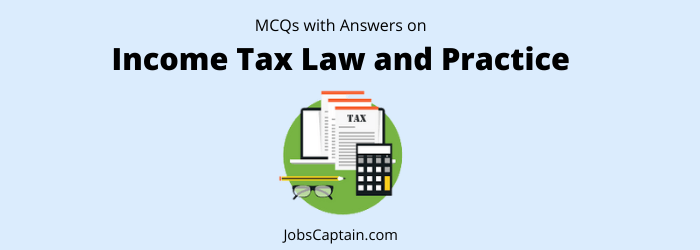
Question 1. The rate of depreciation on intangible asset is _____________.
(A) 20%
(B) 20%
(C) 15%
(D) 5%
Question 2. Residential status of an assessee is ascertained as per the provisions of_____________.
(A) Sec. 11.
(B) Sec. 9.
(C) Sec. 7.
(D) Sec. 6.
Question 3. The income tax rate on long term capital gains for an individual is _____________.
(A) 25%
(B) 20%
(C) 15%
(D) 10%
Question 4. The residential status of taxable entities is_____________.
(A) Fixed in nature.
(B) Fixed once in 5 years.
(C) Can change from year to year.
(D) None of these.
Question 5. As per the first basic condition to determine residential status, a person should have been in India during the previous year concerned for_____________.
(A) 240 days or more.
(B) 182 days or more.
(C) 120 days or more.
(D) 60 days or more
Question 6. An individual who wants to be resident of India must satisfy at least_____________.
(A) Both the basic conditions and the additional conditions
(B) Both the basic conditions.
(C) Both the basic conditions.
(D) One of the Two basic conditions.
Question 7. An individual who wants to be resident of India must stay in India for at least_____________.
(A) 150 days in the previous year.
(B) 365 days in the previous year.
(C) 182 days in the previous year.
(D) 730 days in 10 previous years.
Question 8. A person who is of Indian origin visiting India during the previous year to be called resident must stay in India for at least_____________.
(A) 730 days during 7 years preceding the PY.
(B) 182 days in PY.
(C) 6 days in PY and 365 days or more during 4 years preceding the PY.
(D) 60 days in PY.
Question 9. As per the Second additional condition, a resident will be an ordinarily resident if stay in India for at least _____________ days during the seven previous years preceding the relevant.
(A) 730 days.
(B) 60 days.
(C) 365 days.
(D) 182 days.
Question 10. A person is a Nonresident if he fails to fulfill_____________.
(A) The additional conditions.
(B) Both basic conditions.
(C) At least on of the basic conditions.
(D) None of these
Question 11. In the case of residential status of HUF, firm, and AOP if control and management are wholly outside India they are deemed as_____________.
(A) Resident.
(B) Nonresident
(C) Ordinarily Resident.
(D) None of these.
Question 12. An Indian company’s residential status is that it is always_____________.
(A) Resident.
(B) Ordinarily resident.
(C) Nonresident.
(D) None of these.
Question 13. Salary paid by an Indian company to its employees working in one of its branches outside India is_____________.
(A) Salary accruing in India.
(B) Salary accruing outside India.
(C) Salary deemed to accrue in India.
(D) None of these.
Question 14. Income received in India is taxable in the hands of_____________.
(A) Resident only.
(B) Non-resident only.
(C) Resident and ordinarily resident only.
(D) All assessees.
Question 15. Income accrued in India is taxable in the hands of_____________.
(A) Resident and ordinarily resident only.
(B) All assesses.
(C) Resident and not ordinarily resident only.
(D) Non-resident only.
Question 16. Income accrued and received outside India is taxable in the hands of_____________.
(A) None of these residents.
(B) Resident and not ordinarily.
(C) Resident and ordinarily resident.
(D) Non-resident.
Question 17. Past untaxed income brought to India is taxable in the hands of_____________.
(A) Resident and not ordinarily resident.
(B) Non-resident.
(C) Resident and ordinarily resident.
(D) Non-resident.
Question 18. The CII for the financial year 2012-13 is _____________.
(A) 820
(B) 632
(C) 852
(D) 582
Question 19. Income from a farmhouse is_____________.
(A) Income from other sources
(B) Agricultural income
(C) Income from business
(D) Income from house property
Question 20. Incomes on which Income tax is not charged are called_____________.
(A) Exceptional incomes
(B) Exempted incomes.
(C) Privileged incomes
(D) None of the above
Question 21. Exempted incomes are defined under section_____________.
(A) 20 of income tax Act.
(B) 10 of income tax Act.
(C) 18 of income tax Act.
(D) 15 of income tax Act.
Question 22. Incomes absolutely exempt from Tax are listed under_____________.
(A) Sec. 80c.
(B) Sec 38.
(C) Sec 10.
(D) Sec
Question 23. Scholarship granted is_____________.
(A) Fully exempted.
(B) Partly exempted.
(C) Fully taxable.
(D) None of these.
Question 24. Any payments made under and awards instituted by central or state Governments are_____________.
(A) Fully exempted
(B) Partly exempted.
(C) Fully-taxable
(D) None of these.
Question 25. Allowances of MP/M.L.A / or M.L.C are_____________.
(A) Fully exempted.
(B) Partly exempted.
(C) Fully taxable.
(D) None of these.
